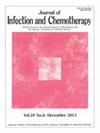COVID-19大流行期间呼吸道合胞病毒感染的流行趋势和难以获得最佳帕利珠单抗预防时机
IF 1.9
4区 医学
Q3 INFECTIOUS DISEASES
引用次数: 0
摘要
目的:新型冠状病毒病(COVID-19)大流行对呼吸道合胞病毒(RSV)感染流行病学的影响。本研究评估了在COVID-19大流行期间帕利珠单抗预防是否合适。结果:在调查期间,共有2133名儿童参与了这项前瞻性研究。结论:帕利珠单抗可用于预防发生严重呼吸道感染的高危儿童因RSV感染而住院。然而,由于RSV感染流行病学不仅在新发传染病(如COVID-19)发生期间发生变化,而且每年都在变化,因此需要一种能够快速识别流行病学的系统,以避免不当使用帕利珠单抗。此外,还需要积极推动母亲接种RSV疫苗,以预防所有婴幼儿严重RSV感染。本文章由计算机程序翻译,如有差异,请以英文原文为准。
Trends in endemic of respiratory syncytial virus infection during COVID-19 pandemic and difficulty in obtaining optimal timing of palivizumab prophylaxis
Objective
The coronavirus disease (COVID-19) pandemic has affected the epidemiology of respiratory syncytial virus (RSV) infection. This study assessed whether or not palivizumab prophylaxis was appropriate during the COVID-19 pandemic.
Methods
This prospective study included children <24 months old who were hospitalized for RSV infection between April 2019 and March 2023. We compared the clinical characteristics of inpatients with RSV infection, with and without palivizumab prophylaxis.
Results
During the investigation period, 2133 children <24 months old were hospitalized for RSV infection. The hospitalization rate of RSV infection in children receiving palivizumab prophylaxis (0.7 %) was significantly lower than that in children without the prophylaxis (3.1 %, P < 0.001), indicating that the timing of prophylaxis was roughly appropriate in preventing hospitalization for RSV infection. In contrast, palivizumab prophylaxis was performed during the non-endemic period of RSV infection due to changes in RSV infection endemics due to the impact of the COVID-19 pandemic.
Conclusion
Palivizumab is useful in preventing hospitalization for RSV infection in children with a high risk of developing severe respiratory tract infections. However, since the RSV infection endemics varies not only during the occurrence of an emerging infectious disease, such as COVID-19, but also from year to year, a system that can quickly recognized the endemics is needed to avoid the inappropriate use of palivizumab. Furthermore, it is also necessary to actively promote maternal RSV vaccination to prevent severe RSV infection in all infants and young children.
求助全文
通过发布文献求助,成功后即可免费获取论文全文。
去求助
来源期刊

Journal of Infection and Chemotherapy
INFECTIOUS DISEASES-PHARMACOLOGY & PHARMACY
CiteScore
4.10
自引率
4.50%
发文量
303
审稿时长
47 days
期刊介绍:
The Journal of Infection and Chemotherapy (JIC) — official journal of the Japanese Society of Chemotherapy and The Japanese Association for Infectious Diseases — welcomes original papers, laboratory or clinical, as well as case reports, notes, committee reports, surveillance and guidelines from all parts of the world on all aspects of chemotherapy, covering the pathogenesis, diagnosis, treatment, and control of infection, including treatment with anticancer drugs. Experimental studies on animal models and pharmacokinetics, and reports on epidemiology and clinical trials are particularly welcome.
 求助内容:
求助内容: 应助结果提醒方式:
应助结果提醒方式:


